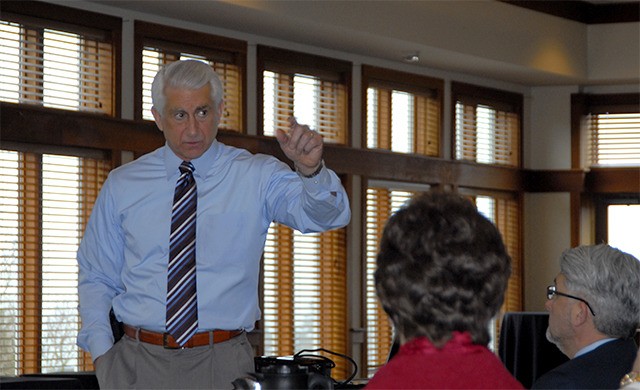Congressman Dave Reichert shed his jacket early in his talk Friday at the Snoqualmie Valley Chamber of Commerce luncheon, but he hadn’t even gotten to the day’s hot topic.
Reichert, U.S. Representative to the House for Washington’s 8th District, covered the recent government shut-down and debt ceiling vote (aggravated by party conflicts), tax reform (potentially from six tax brackets down to three), health insurance (look for more information), immigration reform (much needed), legalizing recreational marijuana (“Why are we telling our kids it’s OK to smoke pot when we’re trying to tell them it’s not OK to smoke cigarettes?”), and minimum wage legislation in the Senate (doesn’t have enough support to pass the House).
Then, from three different sources, he was asked about flood insurance reform. A recent vote in Congress will delay implementation of some elements of the Biggert-Waters Act, he said, “but it’s more of a pause button.”
Chamber CEO Nate Perea, North Bend Mayor Ken Hearing, and insurance agent Angela Donaldson all asked for Reichert’s comments on the bill, and Donaldson asked for a further delay in implementation, saying neither agencies nor home-owners had enough time or money to address the changes that start when parts of the bill take effect Oct. 1, particularly since they are all working from old, potentially outdated floodplain maps.
“If the floodplain management part of it had time to catch up and implement the digital maps,” Donaldson said, “…if we had the time to put that information into a system, then we’re all winners, because we save lives and we save property values.”
Biggert-Waters, the 2012 bill to make the national flood insurance program more self-sustaining, will drive flood insurance premiums up in the Valley, in some cases by thousands. The main effect is a four-year phased increase in flood insurance premium for primary homes, but the full increase in the next year for other properties. Other aspects of the reform include the need for some properties to get elevation certificates, which may call for other expensive flood-proofing measures on a property before it can qualify for the insurance.
Reichert listened attentively, and assured the group that their concerns were not new information to him. He said there were several entities involved in implementing the bill, which may have led to some complications and citizens’ frustrations with the process to date. He also said the entities were still working together on solutions to the issues people raised.

Angela Donaldson, speaking at the Feb. 21 Chamber luncheon, makes a case to 8th District Congressman Dave Reichert for delaying implementation of the Biggert-Waters Act flood insurance reforms, the day’s hot topic.

Reichert was welcomed by a large audience during his Congressional update to members of the Snoqualmie Valley Chamber of Commerce.

Above, Reichert with host Nate Perea, Chamber CEO.



